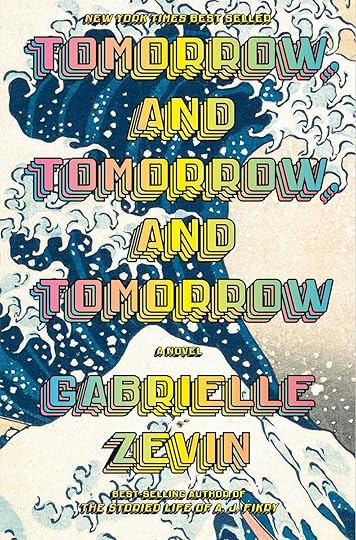Book Review: 'Tomorrow and Tomorrow and Tomorrow' by Gabrielle Zevin
I have lived through the advent of computers, the Internet, and smartphones. I anticipate IoT and VR as daily immersive experience. I admit that reading this novel makes me feel old and crusty. I am not a gamer, never have been. Oh, I played chess daily when my university education was interrupted because I was recovering from tuberculosis in the late 1960s. And in my first year living in school in an all-male dormitory, I was dubbed “the reluctant fourth” for any game of bridge. My wife Georja delights in all games, especially any kind of cards. But she cheats skillfully at Monopoly - and delights in it - which I learned is kind of the point if you want to have fun with capitalism.
To me, gaming has no point. I obviously don’t get it.
My very first novel, My Inflatable Friend, is a skirt-chasing romantic comedy about a young man who fails continually upward. About the time it was released, the game Leisure Suit Larry was hot. I guessed that a game could be built on my novel in that mock-machismo genre. Back then, I had several conversations with a pioneer game developer, and it became quickly apparent that I had no idea how computer games must work. It must have something to do with gaining points and suffering penalties, but the paradigm for this kind of experience seemed alien from my original storytelling. I wanted the story to have a point, and I wanted to control the outcome. I gave up on the idea of turning my novel into a game.
Later, I became involved in an abortive book project as a supplement to Activision’s announced game, MechWarrior. I learned that, at the level of code, such games are interactions between two databases - one for the player and one for the opponent of the moment - tables of choices and weapons and their associated powers. When I pick up an axe, I have added power. But my opponent has a crossbow and more power. The engine is a dynamic math equation of capabilities and outcomes, depending on the choices of player and automaton. Rock, paper, scissors - repeat until you get tired or die!
Ho hum, I thought.
I do also remember there were discussions among the members of the Writers Guild about the advent of feature movies with alternate endings. The theater audience would be able to vote for how it all turned out.
Perhaps not surprisingly, movie audiences craved the author’s vision, the storyteller’s personal expression. Interactive movies, as originally conceived, didn’t become a thing.
But a game is not the same as an interactive story. In a movie with alternate endings, the audience is a focus group. In a game, the player is a coauthor. Therein lies the crucial difference.

Bestseller novel from Knopf. Movie in development at Paramount.



